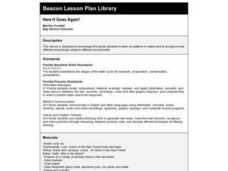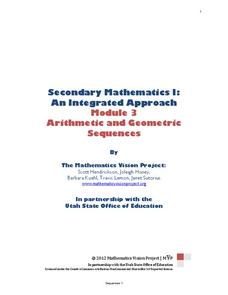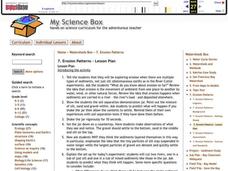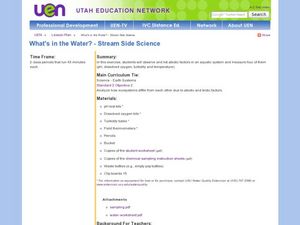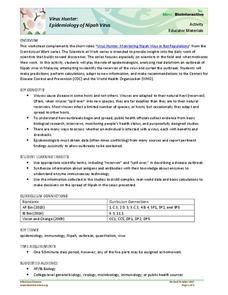Virginia Department of Education
Mendelian Genetics
How did Mendel know which pea plants would demonstrate certain characteristics? Pupils explore the answer this question, among others, as they complete Punnet squares, research dominant and recessive traits, and explore hereditary...
G. Turrell
Science Activity 2: Light & Sound
Little learners experiment with sunlight and map out how light travels. Using a mirror and slotted card, they find out about items that can reflect or absorb the light. They experiment with a variety of materials to find out how light...
G. Turrell
Science Activity 1: Light & Sound
Are you looking for lab sheets to go with your class experiment on plant response to light? You are no longer in the dark! This is a lesson that was written for a unit on light, but could easily be used to demonstrate plant behaviors in...
Serendip
The Ecology of Lyme Disease
Areas that previously included no risk of Lyme disease now have cases every year. Scholars learn about the spread of Lyme disease and the relationship with ecological succession. Then, they discuss possible solutions using the known food...
Curated OER
Mining in a Nutshell
Your class will love this geology-inspired set of activities that demonstrate the processes through which we are able to use mineral resources. They describe the major steps that a company must follow from initial discovery of a mineral...
University of Colorado
Are All Asteroids' Surfaces the Same Age?
Did you know scientists can tell the age of an asteroid by looking closely at its craters? This final instructional activity of a six-part series focuses on two asteroids, Gaspra and Ida, in order to demonstrate the concept of dating...
Curated OER
Life Cycle of Trees
Turn your students into young tree-tectives with this fun science investigation into the life of trees. To begin, a class volunteer gets dressed up in a tree costume as the different parts of trees are introduced. Then, the class learns...
Curated OER
The Water Cycle: A Repeating Pattern in Nature
Students are introduced to the terms related to the water cycle in their native language. In groups, they describe the steps of the cycle using different materials found in their art classroom. They describe how energy helps water...
Curated OER
The Hydrologic (Water) Cycle
Learners construct a model of the hydrologic cycle, and observe that water is an element of a cycle in the natural environment. They explain how the hydrologic cycle works and why it is important, and compare the hydrologic cycle to...
Curated OER
Here It Goes Again!
First graders work on patterns in nature and to recognize how different living things adapt to different environments such as the rain forest.
Mathematics Vision Project
Module 3: Arithmetic and Geometric Sequences
Natural human interest in patterns and algebraic study of function notation are linked in this introductory unit on the properties of sequences. Once presented with a pattern or situation, the class works through how to justify...
Curated OER
Cycles and Starting Mealworms
Here is a fascinating lesson about the life cycles of plants and animals, and other cycles found in nature. Learners explore the cycle of the moon, the tides, and other sequences of events in every day life. The big activity is the...
Curated OER
PATTERNS IN TIME
Students build a realistic sense of geological time, seek clues of transition fossils and find them. In this investigative instructional activity students complete several activities and worksheets on fossils.
Curated OER
Natural Selection
Kids act as scientists and preditors in this short natural selection activity; they collect and analyze data, then apply their new knowledge to real-world examples of natural selection. The layout of the worksheet is easy enough to use...
Virginia Department of Education
Weather Patterns and Seasonal Changes
Get your class outside to observe their surroundings with a lesson plan highlighting weather patterns and seasonal changes. First, learners take a weather walk to survey how the weather affects animals, people, plants, and trees during...
Curated OER
Swamps, Shrimp, and Tsunamis: A Simulation of Sustainable Development Issues in Coastal Ecuador
Students examine the economic benefits, environmental losses and dangers of the shrimp farming industry on the coast of Ecuador. They read a script, role-play people involved in the shrimp business, and write an essay of the pros and cons.
Curated OER
Erosion Patterns
Middle schoolers explore erosion when there are multiple types of sediments. They view a soil separation demonstration jar before and after agitation to determine how and why the layers settled. In addition, they conduct experiments with...
NOAA
To Explore Strange New Worlds
It's time to boldly go where your class has not gone before! The introductory lesson in a five-part series takes young oceanographers aboard the NOAA Ship Okeanos to begin a study of ocean exploration. The lesson includes a comparison of...
Curated OER
That's Predictable - Stream Side Science
Research the impact that changes in biotic or abiotic factors might have on an ecosystem. Debate for or against the changes and take action in the community. This resource ideally follows stream studies that young ecologists may have...
Curated OER
What's in the Water? - Stream Side Science
Here is a complete activity in which young biologists or ecologists test the pH, dissolved oxygen, turbidity and temperature of stream water. The class visits an actual stream and makes observations of the site. They use scientific...
Curated OER
Where in the Wild?
Young scholars investigate the purpose of animals' ability to camouflage. In this animal science lesson, students read the text Where in the Wild? and identify animals that are predators and prey. Young scholars discuss how camouflage is...
Howard Hughes Medical Institute
Virus Hunters: Epidemiology of Nipah Virus
Who actually goes looking for a virus? Expose your class to the high-stakes life of an epidemiologist on the trail of the Nipah virus. Pupils engage in a short video, then examine how scientists predict, model, and find the source of...
Curated OER
Settlement Exploration: Then and Now
NASA has crafted an imaginative and memorable series of lessons, "NASA and Jamestown Education Module." This instructional activity is one of the five components. In it, middle schoolers connect history and science by comparing the...
Curated OER
Make a Natural Weaving
Students use natural materials and yarn to create weavings. For this natural weaving lesson, students find large branches to act as the loom, use other natural objects to act as designs within the weave, and use fine motor skills to wrap...











